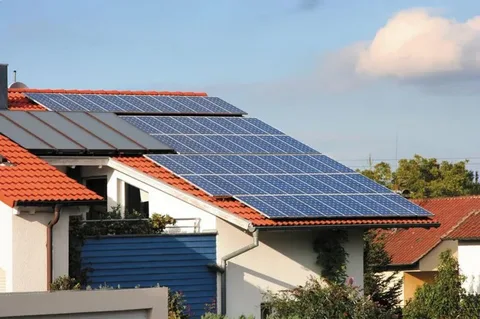When considering solar power for your home, one of the most important decisions is whether to choose a grid-tied or off-grid solar system. Both options offer unique benefits and challenges, making it essential to understand which system aligns best with your lifestyle, energy needs, and budget. In this article, we’ll break down the differences between these two types of home solar systems to help you answer the question: Grid-Tied vs Off-Grid: Which solar system for home Is Best for You?
Understanding Grid-Tied Solar Systems
A grid-tied solar system is connected to your local utility grid. This setup allows you to generate your own electricity while still relying on the grid as a backup source. When your solar panels produce more electricity than you use, the excess can be sent back to the grid, often earning you credits through net metering.
Advantages of Grid-Tied Systems
- Lower Initial Costs: Since grid-tied systems don’t require expensive batteries, the upfront investment tends to be more affordable.
- Energy Security: You can draw power from the grid when your solar panels aren’t producing enough electricity, such as during nighttime or cloudy days.
- Financial Benefits: Many utilities offer net metering, which can offset your electricity bill by crediting you for surplus power sent back to the grid.
Considerations
- No Power During Outages: For safety reasons, grid-tied systems automatically shut down during a power outage unless paired with battery storage.
- Dependence on the Grid: If your goal is complete energy independence, a grid-tied system alone won’t achieve that.
Exploring Off-Grid Solar Systems
Off-grid solar systems operate independently of the utility grid. These setups require batteries to store energy generated during the day, which can then be used at night or during periods of low sunlight. This option is ideal for remote locations or homeowners looking to achieve total energy autonomy.
Advantages of Off-Grid Systems
- Complete Energy Independence: You’re not reliant on the utility grid, which is perfect for remote or rural areas without reliable power access.
- Power During Outages: Since you have battery storage, you can maintain electricity during blackouts.
- Environmental Benefits: Off-grid systems encourage energy conservation and self-sufficiency, reducing your carbon footprint.
Considerations
- Higher Costs: Batteries and additional equipment increase the initial investment and maintenance costs.
- Energy Management: You must carefully monitor and manage your energy usage to avoid running out of stored power.
- System Size: Off-grid systems often require larger solar arrays and battery banks to meet all energy needs.
Grid-Tied vs Off-Grid: Which Home Solar System Is Best for You?
Choosing between grid-tied and off-grid solar systems depends on several factors, including location, budget, and your energy goals.
- If you live in an area with a reliable grid and want to save money upfront, a grid-tied system is likely the best choice. It offers convenience, lower costs, and financial incentives like net metering.
- If you seek full energy independence or live in a remote area without grid access, an off-grid system is the way to go. Though more costly, it provides autonomy and reliability during outages.
Final Thoughts
When deciding on Grid-Tied vs Off-Grid: Which Home Solar System Is Best for You?, consider your lifestyle, financial capacity, and energy needs. Many homeowners also opt for hybrid systems that combine the benefits of both by using grid connection alongside battery storage.
Ultimately, both grid-tied and off-grid solar systems contribute to a greener future, helping reduce reliance on fossil fuels and lowering your electricity bills. By understanding the pros and cons of each, you can make an informed decision that best suits your home and energy goals.


